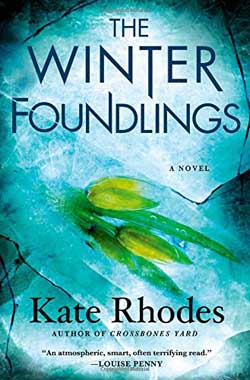 The Winter Foundlings by Kate Rhodes is the third book starring forensic psychologist Alice Quentin who heads to a psychiatric prison to interview an inmate (available February 24, 2015).
The Winter Foundlings by Kate Rhodes is the third book starring forensic psychologist Alice Quentin who heads to a psychiatric prison to interview an inmate (available February 24, 2015).
It’s hard not to draw comparisons to Silence of the Lambs when reading Kate Rhodes’ third novel, The Winter Foundlings, which continues the story of forensic psychologist Alice Quentin. The book opens as Quentin embarks on a six-month sabbatical in an effort to recover from dangers she endured during recent work with the London police. We’d need a psychologist to explain why her choice for that respite is to study treatment methods at Northwood, England’s largest psychiatric prison, and particularly within the Laurels, which houses its most violent criminals. She’s barely settled into her closet-sized office when she is called to assist DCI Burns, with whom she’s worked before, by interviewing one of the inmates.
Louis Kinsella has been incarcerated for years in the Laurels for committing child murders that appear very similar to a series of child abductions and killings now taking place. The perpetrator apes so well Kinsella’s methods and style that DCI Burns believes Kinsella knows the culprit. Quentin’s task is to get Kinsella to reveal the name of the current killer. Unlike Hannibal Lecter, however, this madman offers no incisive verbal jousts; he speaks almost never. Yet he doesn’t need to speak to unsettle Quentin; his looks alone are enough to incite dread:
On closer inspection I saw that the man’s left wrist was handcuffed to the metal frame of his chair, and when I studied him more closely, I realised it was Louis Kinsella. He twisted round in his seat to face us, and his gaze had a disturbing intensity. He still bore an uncanny likeness to my father. Even his stare was identical, letting me know that I’d failed him without uttering a word.
However silent Kinsella may be, others at the psychiatric prison do plenty of talking. Not other inmates—we never more than glimpse them or hear their din—but various members of the staff. They are an odd lot, arguably more distinguishable by their quirks of behavior than by their roles in the Laurels community. As the relationship of each to Kinsella is revealed, the list of possible suspects lengthens. Quentin’s interactions with them alternately enrich the narrative and, in contrast to Thomas Harris’s tale, diminish the reader’s focus on her relationship with Kinsella.
Rhodes is a brave writer to have a character tread where Hannibal Lecter has so persuasively gone before. Kinsella offers no quotable lines, no fava beans or nice Chianti, and it’s a challenge not to miss such bits, which ensure Lecter’s continuing status as the gold standard for this type of villain. The most convincing aspect of Rhodes’s book, what helps most to keep it from reading like yet another tale of the incarcerated-killer-and-the-damaged-young-woman-sent-to-break-him, is the way Rhodes brings the young victims before us:
It’s been days since Ella ate anything; the hunger has become a dull pain that never stops. The man hasn’t been back since he took her out in the van, and the box has felt smaller since then, stale air smothering her.
“Do you know what day it is, Ella?” the man asks when he unlocks the door.
“I can’t remember.”
“Christmas Eve, silly girl.”
The torchlight settles on her face and she stretches her lips wider. Instinct tells her to shield her eyes from the dazzling light, but it’s safest not to move a muscle. His shadow looms behind the bright wall of light. It’s impossible to guess whether he’s pleased or angry. Her hands are so cold, they can no longer move, fingers brittle as icicles. Maybe he’ll put her in the van again, and drive around for hours. That would be better than staying inside the box; at least then she could watch the world passing, instead of staring at the dark. Tears seep from the corners of her eyes, but her smile doesn’t falter.
Ten-year-old Ella’s struggle to survive makes for compelling reading. Her view of her predicament, her fellow victims, and of the person who put them there, is by turns touching and haunting. More than any of the adults, including Alice Quentin herself, Ella offers readers reason to turn every next page. It can sometimes be a relief to simply relish the fight of one's innocence and goodness rather than be clutched by the mesmerizing draw of unmatched evil.
To learn more or order a copy, visit:
Kate Lincoln writes crime fiction informed by her years in clinical medicine and as a homeopath and EMT, most of which is set in New Jersey horse country called the Somerset Hills.
See all of Kate Lincoln’s posts for Criminal Element.
